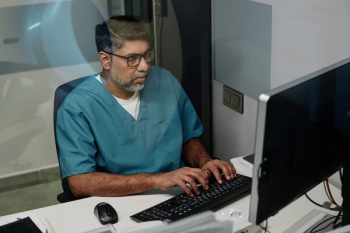
The High-Stakes Poker Game of Job Negotiation
Know your audience to maximize your value.
I suppose it’s possible that some readers are not yet aware of the increasingly-hopping nature of the radiology job market (at least, in the USA where I live and work). And that some might not have seen my recent blogs, in which I shared that I, myself, have been navigating the waters of said market, which has resulted in no small amount of material for my subsequent columns.
As a new job goes from a scant-detail blurb on a website (or cold-call/email from a recruiter) to a serious consideration, if not desirable prospect, numbers start to get involved. One can make all the noise one likes about how the dollars and cents aren’t the most important aspect of one’s profession … but in the final analysis, most of us are doing this stuff for a living.
So negotiations enter the picture sooner or later: Under most circumstances a rad wants to get paid (call it “compensated” if you prefer) as much as possible, and whatever entity is going to employ or otherwise utilize the rad wants to pay as little as possible. (Barring lunatic-fringe ideas of numbers so above or below the norm that something has got to be wrong with the picture.)
Because negotiations have probably been around for as long as humans have been able to communicate with one another, there’s no small amount of wisdom out there as to how to proceed in the name of getting the best possible results. A lot of that wisdom is situation-specific, however; what’s smart/effective in one circumstance might be foolhardy in another.
I’ve had occasion to consider these negotiations akin to a game of poker. Once upon a time, I had the pleasure of intermittent games with friends. Extremely low-stakes, like pocket-change, because none of us came from money and much of the time we were indebted students. It was more about enjoying the game than trying to make a few bucks off of one another. In the process, one inadvertently learns a thing or two.
A couple of friends learned enough to subsequently play against strangers in casinos for bigger bucks, something I found decidedly less fun and more nerve-racking. That does, however, lead me to my bit of advice: Know your audience. In poker, if you’re playing against strangers you’re probably never going to see again, it’s a lot more likely to be about winning as much as you can. Take that attitude when playing against a few friends for pocket-change, and you’re liable to be disappointed (also maybe not invited back for subsequent games, if they perceive you were more about their money than their fun company).
I haven’t heard too many folks talk about this consideration when it comes down to going over compensation-details for a prospective job. The focus, understandably, is almost always on getting as much as you can without demanding too much and killing the deal. Here’s the thing, though: This is not a bank heist, where you’re grabbing all you can before a swift getaway. Unless you know ahead of time that this job is not one you’re going to stick with for all that long, these are folks with whom you’re hoping to work for a good chunk of your remaining career, if not all of it.
So suppose you relentlessly go after every nickel and penny on the table, and get it all. You now have a job for the absolute maximum the employer was willing to pay. Chances are excellent you’ve left them with a “this guy/gal better be worth it” attitude, and perhaps a bias towards discovering that you’re not. Not exactly the ideal way to start your working-relationship.
Or, perhaps you’re a bit more relaxed about it, and leave them feeling like they got a bit of a bargain with you. I’m not talking about selling yourself short, but instead demonstrating your understanding that, just as you’re taking something of a leap of faith in signing up with them, they’re doing the same with you, and you’re willing to make that leap a bit less drastic. Some phrasing I used at one point: I want to prove myself to you [the employer], establishing a good track-record and showing my worth rather than expecting everything up front.
If they turn out to be the “real deal,” and your working-relationship does indeed last, there will be plenty of subsequent opportunity for raises and bonuses to make up whatever pittance of an initial shortfall you gave yourself. At the very least, you’re ending the first phase of your new professional relationship on a pleasant note.
Newsletter
Stay at the forefront of radiology with the Diagnostic Imaging newsletter, delivering the latest news, clinical insights, and imaging advancements for today’s radiologists.












